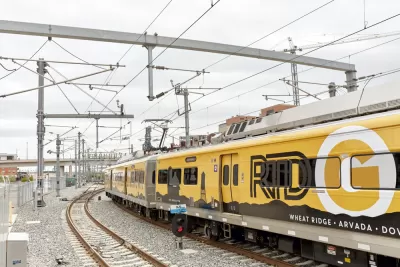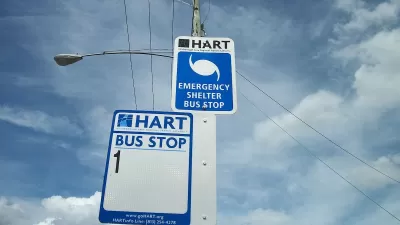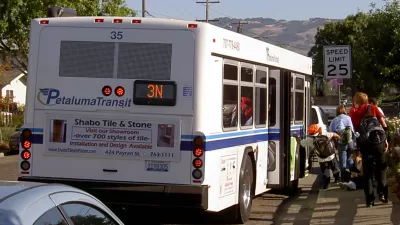The state is weighing a plan to offer free transit rides during ozone-heavy months in an effort to improve the state's air quality.

A bill proposed in the Colorado state legislature would allocate funding for free transit rides as an effort to curb air pollution in the state and encourage more public transit ridership, writes Sam Brasch for Colorado Public Radio. State Senator Faith Winter (D) said "One of the ways that need to address that pollution is to increase transit ridership, which is a challenge coming out of the pandemic."
Brasch writes that "If the proposed legislation passes, the Colorado Energy Office would oversee a new grant program to help eliminate fares during the summer ozone season, which lasts from June 1 through Aug. 31. It provides enough funding to award $11 million per year to metro Denver's Regional Transportation District and $3 million per year to all other local transit associations."
The proposal received some pushback from the Regional Transportation District (RTD), the Denver-area transit agency. "During negations [sic] on the bill, [Marta Sipeki, RTD’s interim assistant general manager of communications], said RTD leaders pushed for a 'more cautious, incremental approach' to free transit because the agency has struggled to hire enough drivers and handle a surge in crime, drug use and violence at some of its facilities."
As a result, if the legislation passes, the agency will start by offering free rides during the month of August rather than the entire summer over the next two years.
FULL STORY: A new Colorado bill would fund free transit rides in the summer to help improve air quality

Study: Maui’s Plan to Convert Vacation Rentals to Long-Term Housing Could Cause Nearly $1 Billion Economic Loss
The plan would reduce visitor accommodation by 25,% resulting in 1,900 jobs lost.

North Texas Transit Leaders Tout Benefits of TOD for Growing Region
At a summit focused on transit-oriented development, policymakers discussed how North Texas’ expanded light rail system can serve as a tool for economic growth.

Why Should We Subsidize Public Transportation?
Many public transit agencies face financial stress due to rising costs, declining fare revenue, and declining subsidies. Transit advocates must provide a strong business case for increasing public transit funding.

How to Make US Trains Faster
Changes to boarding platforms and a switch to electric trains could improve U.S. passenger rail service without the added cost of high-speed rail.

Columbia’s Revitalized ‘Loop’ Is a Hub for Local Entrepreneurs
A focus on small businesses is helping a commercial corridor in Columbia, Missouri thrive.

Invasive Insect Threatens Minnesota’s Ash Forests
The Emerald Ash Borer is a rapidly spreading invasive pest threatening Minnesota’s ash trees, and homeowners are encouraged to plant diverse replacement species, avoid moving ash firewood, and monitor for signs of infestation.
Urban Design for Planners 1: Software Tools
This six-course series explores essential urban design concepts using open source software and equips planners with the tools they need to participate fully in the urban design process.
Planning for Universal Design
Learn the tools for implementing Universal Design in planning regulations.
Ascent Environmental
Borough of Carlisle
Institute for Housing and Urban Development Studies (IHS)
City of Grandview
Harvard GSD Executive Education
Toledo-Lucas County Plan Commissions
Salt Lake City
NYU Wagner Graduate School of Public Service





























